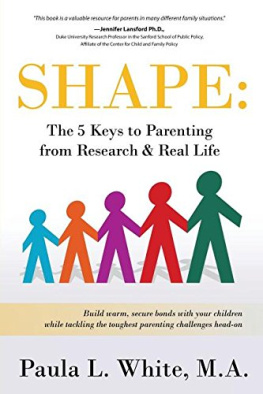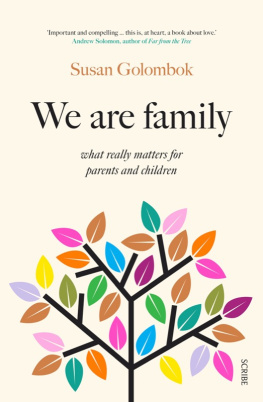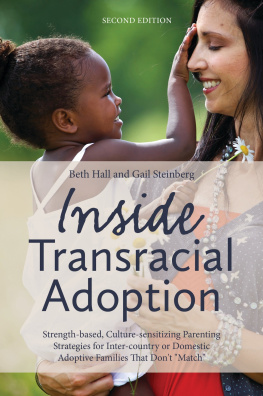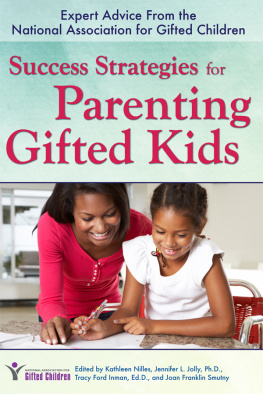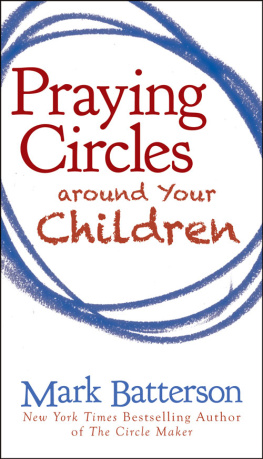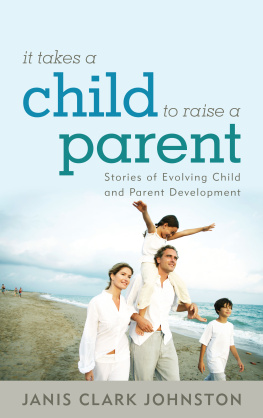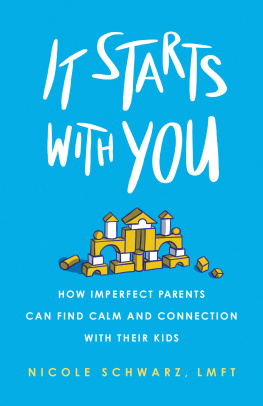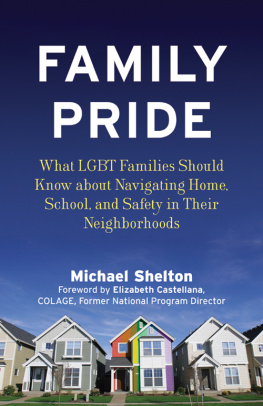You didnt have a choice about the parents you inherited, but you do have a choice about the kind of parent you will be.
Marian Wright Edelman
INTRODUCTION
The Story of SHAPE
I sometimes get mad at my parents for giving me a picture-perfect life. You see, the only downside to my childhood is that my folks left me with no sob story to fall back on or blame for my failures and mistakes. My younger years had no sad tales of abuse or neglect, no cries for love or support that fell on deaf ears, no absent father or self-absorbed mother to derail my happiness or success. I come from a middle class family with the best mom and dad a girl could ask for they made sure that I had love, a solid faith foundation, guidance and support, great educational opportunities, and constant doses of laughter along the way.
When I became an adult, I expected my child-rearing years to follow a seamless, predictable path. With a supportive husband, a bachelors degree in child development, and years spent teaching young children and counseling teenagers, I approached parenthood with the confidence of an overqualified job applicant, ready to usher three peaceful, productive children into adulthood with ease. I did all the right things with my sons I was loving and warm, breastfed each of them for several months, played with them daily, and taught them all to read before they entered kindergarten. They werent overscheduled, but they had a stimulating range of activities throughout the year violin lessons, African drumming, art classes, swimming, tennis, and academic enrichment programs like robotics and summer writing intensives. Our weekends, always spent together as a family, included museum and botanical garden visits, and outings to the park.
With all of the obligatory parenting boxes checked, I was convinced that my journey came with a glitch-free guarantee. Sure there were calls from school when the boys got too rambunctious, and there was the time one son was caught red-handed stealing a candy bar from the local grocery store. There were also acts of meanness and mischief at home that gave me pause, but my friends insisted that this was inevitable in a house overrun by testosterone. I decided then to relax, and I envisioned our lives as fine, unfolding as successfully as I had planned.
And then, one day, our lives werent fine at all. My twenty-year marriage ended in a jarring way, and things quickly spiraled out of control. We were regularly imperfect before, but the new journey felt hopeless, like trying to gather up spilled toothpaste and put it back into the tube. Topping it off was my new career, launching a new public school in the toughest neighborhood in a really tough city, while raising children without any support from a husband.
With my schools board meetings, PTA events and various other demands, regular mealtimes at home fell by the wayside. One son complained about always being the last kid to be picked up from soccer practice, while another filled the void of my parental absence with newfound friends that I wished hed never met. Trouble at home and at school began to feel like the norm, and almost every family interaction began to feel like a fight. Inside I felt lost, and for the first time that I could recall, I doubted my ability to find my way.
I was drowning in my own life, not knowing where to turn, when the truth hit me like a ton of bricks that from the moment our children become ours to raise, were generally left to fend for ourselves and unless we really screw things up, causing serious physical or emotional damage to our kids, theres no reliable parenting help from anyone at all. If we do manage to get by without screwing up, help might still be on the way, but only if were in the unfortunate position of having kids who screw up instead. This means that to get anyones assistance with parenting, our children must do dangerous or destructive things hurt themselves, act out in school, use drugs, or commit crimes. We would all prefer to be cocooned in a web of parenting support before our lives become harried or undone, but thats just not the way things usually work.
Thankfully, after being engulfed in what felt like a lifetime of meltdowns and hurt, our familys worst period became the pivotal life segment that produced SHAPE. Desperate to make us whole, I analyzed our family in an academic way. I asked myself, if I were a sociologist studying this family, what are the things that I would see? Next, I asked myself, if I wanted to showcase a great family, would I be prepared to nominate my own?
I decided then to consciously define what I wanted to cultivate in myself as a parent and what I wanted to transmit to my children. I spent more time noticing how my children interacted with me and how I responded to their actions. I captured the routines I took for granted, and the ideas that I had toyed with but never brought to fruition. I reached back into my childhood for some of the practices my parents used when they were raising me; things that my own arrogance and my husbands world view led me to abandon. I also reflected on the young children I taught, the teenagers Id worked with and the parents I dealt with, whose gaps, because they werent my own, were very clear to see. Throughout this process, I summoned the knowledge I gained from my degree in child development and the intellectual discipline I developed as a graduate-level educator as I modified and fine-tuned my approach. Our lives improved as I began to use the guidance I was creating the one that I wished I had at the outset when an interrupted life made me lose my way. What finally emerged was SHAPE a parenting frame that honors what parents and children need to thrive.
Parents are a natural, integral part of our society, but that doesnt mean we shouldnt make the tenets of good parenting more transparent and form a supportive community to help each other. Think of women and breastfeeding women naturally develop breasts, most of them perfectly crafted and equipped by nature to provide nourishment to any child we bear. Yet, until a groundswell of breastfeeding support from institutions and advocacy groups surfaced, rates of breastfeeding were low, and much fewer women were actively nursing. In recent years, breastfeeding rates have risen, proving that education and support can make a difference in doing something better, even if that something happens naturally.
Well-meaning mothers and fathers are blindly clawing their way through the maze of raising children, with very little to guide them other than their own childhood experiences. Our intergenerational ties are often looser than they were in our grandparents generation, depriving us of some of the cultural transmission that our ancestors benefited from, and even for those parents worthy of an A grade for the way that they raised us, they were not responsible for guiding children in the modern culture we live in today. Just think - through the magic of social media, our children can have access to an entire set of friends hanging out virtually in their bedrooms friends we never approved of or even knew a single thing about. Our parents couldnt have imagined this, yet it typifies the reality of our contemporary lives.
Despite your best efforts, your children will struggle whether with mild disobedience or disrespect, with life-altering problems like chronic delinquency or drug addiction, or with something as relatively benign as a disorganized, messy room. You are not alone. For this reason, I wrote SHAPE. Lets be clear though SHAPE wont fix anyone in your family. You, your spouse or parent partner (if you have one), and your children, have strengths and abilities that make self-directedness possible. Thats a good thing, because the fact is that our job as parents is not to fix our children but to clear the path for our children to eventually lead or fix themselves.
Next page
